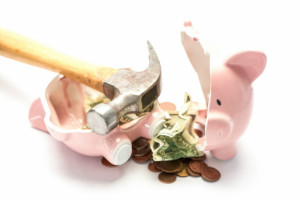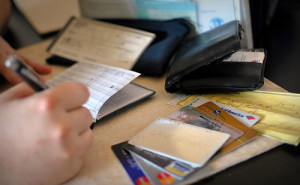 If you’ve recently tried to borrow some money or take out a credit card but have had the dreaded rejection email or letter, it’s pretty much certain that there is something amiss with your credit score. This can seem like an enormous setback, an intractable problem that is going to wreck your plans and prevent you from getting on in life.
If you’ve recently tried to borrow some money or take out a credit card but have had the dreaded rejection email or letter, it’s pretty much certain that there is something amiss with your credit score. This can seem like an enormous setback, an intractable problem that is going to wreck your plans and prevent you from getting on in life.
But, bad credit scores are not only highly common; they are highly fixable too. Many hundreds of thousands of people in the United Kingdom suffer impaired credit ratings and yet still manage to borrow money through the so-called sub prime lending sector.
Furthermore, given good financial management and discipline, these people are able to fix their credit scores so that, after a certain period, they regain access to more mainstream forms of credit.
Credit scores explained
There are three main credit reference agencies in the UK – they are Experian, Equifax and CallCredit. These organisations hold data on every person who has borrowed money, holds a utility or insurance account or a mobile phone contract. This data includes information that includes existing and past addresses, the payment history on each account (whether payments are and have been kept up to date), a record of any defaults, bankruptcies or county court judgements (CCJs).
The information is straightforward. You can apply to one or all of the reference agencies for a copy or your record (for the payment of a small fee) and you should be able to see immediately where your problems lie if you’re having trouble getting access to credit.
But, it is how the agencies and financial organisations interpret the data that results in a credit score. This number – usually between 300 and 900 (although this varies according to which agencies figures are being used) – is an expression of risk that a borrower represents to a lender. The lower the score, the higher the risk. Some agencies will express that risk as very poor, poor, fair, good or excellent. Very poor might be a rating between 300 and 400 while good and excellent might extend all the way from 700 up to 900.
Those judged to be very poor are likely to have difficulty getting access to most forms of credit. They will struggle to be accepted for loans, credit cards, bank accounts and even mobile contracts. This rating may even affect their ability to get a new electricity or water account set up.
People with poor credit ratings are likely to be rejected by many lenders, but some will consider their applications. However, they are likely to face higher interest charges, lower loan amounts and, sometimes, requests by the lender that they put up some form of security before a loan is issued.
Fair credit ratings are in the middle of the pack. If you fall into this category, you will find that you will have a wider choice of loans and credit cards than people in the categories below you. However, it is almost certain that you will have to pay higher interest charges than people in the higher categories.
People with good credit ratings will be accepted for most loans and credit cards that they apply for. There is a small chance that they will have to pay slightly higher interest charges. Excellent credit ratings are the ones which we all aspire to have. People in this category are almost guaranteed to be accepted for any form of credit and will pay the lowest interest rates and charges.
How to fix a bad credit score
While the immediate situation can seem bleak, it is perfectly possible to repair your credit score with time and discipline. There is no ‘quick fix’ but experience shows that people with poor or very poor scores can get back to good and then excellent within a couple of years. Here’s how they do it:
1. They make their repayments on time
Your financial mistakes will fade over time as long as you start behaving responsibly now. That means making payments on time, every time from now on. Over time, this good behaviour will start to outweigh the late or missed payments on your credit record.
2. Settle accounts
If you have got a bit of money in the bank, consider whether you should pay off a credit card balance or loan rather than splashing out on something new. This is particularly good and viewed very favourably if you’ve maxed out your cards because it will reduce your overall debt to income ratio and will have a pretty rapid effect on your credit score.
3. Get a ‘credit builder’ credit card
Some of the big banks and major financial organisations offer versions of their mainstream credit cards for people with poor credit records. You’ll hear these referred to as ‘credit builder’ or ‘credit repair’ cards and although they will come with lower credit limits and higher APRs than those offered to people with good credit records, they will allow you to quickly demonstrate financial rectitude by repaying a small amount of borrowing on time. This will be reflected on your credit record every time you make the payment.
4. Look at your credit records
It will cost you just a few pounds to get hold of your records from the major reference agencies. It’s worth doing because it will allow you to see where the problem areas are and take corrective action or to turn up any mistakes on your record. If there are mistakes, you should write to the agencies and explain them. The record will generally show your credit score so you will know how much work you have to do.
5. Take out a guarantor loan
This is an excellent way to rebuild a credit score. A guarantor loan will allow somebody who has a bad credit score to use the record of somebody else to borrow money. A friend or family member will stand as guarantor for the borrowing, becoming liable to make the repayments if the borrower slips up. As a result, the lender looks at the score of the guarantor, not the applicant, but every repayment made on time is recorded on the borrower’s record. Over time, this will improve a credit score.
Article provided by Mike James, an independent content writer in the finance industry working together with technology-led finance broker Solution Loans, who were consulted over this post.
 Debts are an unfortunate part of life. Unless you come from a particularly rich family and have all the luck in the world, you’re going to have to deal with debts at some point. It might be loans for education, your home or your business. It might be because of credit cards that we’ve lost track of. Or perhaps overdrafts that we dug into a little too far. How much you dug into debt doesn’t matter all that much. What does is taking control and getting back out of it. Below, we take a look at how exactly that might happen. Whether it’s managing or getting your debt forgiven altogether. Or whether it’s rolling up your sleeves and organising your finances like you’ve never organised before.
Debts are an unfortunate part of life. Unless you come from a particularly rich family and have all the luck in the world, you’re going to have to deal with debts at some point. It might be loans for education, your home or your business. It might be because of credit cards that we’ve lost track of. Or perhaps overdrafts that we dug into a little too far. How much you dug into debt doesn’t matter all that much. What does is taking control and getting back out of it. Below, we take a look at how exactly that might happen. Whether it’s managing or getting your debt forgiven altogether. Or whether it’s rolling up your sleeves and organising your finances like you’ve never organised before.















